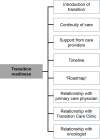The experiences of cancer survivors while transitioning from tertiary to primary care
- PMID: 28050133
- PMCID: PMC5176370
- DOI: 10.3747/co.23.3140
The experiences of cancer survivors while transitioning from tertiary to primary care
Abstract
Purpose: In current fiscally constrained health care systems, the transition of cancer survivors to primary care from tertiary care settings is becoming more common and necessary. The purpose of our study was to explore the experiences of survivors who are transitioning from tertiary to primary care.
Methods: One focus group and ten individual telephone interviews were conducted. Data saturation was reached with 13 participants. All sessions were audio-recorded, transcribed verbatim, and analyzed using a qualitative descriptive approach.
Results: Eight categories relating to the main content category of transition readiness were identified in the analysis. Several factors affected participant transition readiness: how the transition was introduced, perceived continuity of care, support from health care providers, clarity of the timeline throughout the transition, and desire for a "roadmap." Although all participants spoke about the effect of their relationships with health care providers (tertiary, transition, and primary care), their relationship with the primary care provider had the most influence on their transition readiness.
Conclusions: Our study provided insights into survivor experiences during the transition to primary care. Transition readiness of survivors is affected by many factors, with their relationship with the primary care provider being particularly influential. Understanding transition readiness from the survivor perspective could prove useful in ensuring patient-centred care as transitions from tertiary to primary care become commonplace.
Keywords: Primary care; patient-centred care; qualitative research; survivors; transitions in care.
Figures
References
-
- Hewitt M, Greenfield S, Stovall E, editors. From Cancer Patient to Cancer Survivor: Lost in Transition. Washington, DC: National Academies Press; 2005.
LinkOut - more resources
Full Text Sources
Other Literature Sources


